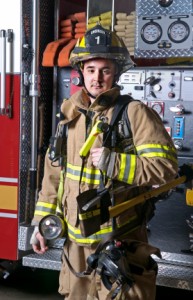 The Illinois Appellate Court recently decided the case of Williams vs. Board of Trustees of Morton Grove Firefighters Pension Board, 398 Ill.App.3d 680 (1st Dist. 2010). In this case, the Court addressed two important concepts that frequently come up in adjudicating firefighter disability claims, Intervention and Due Process.
The Illinois Appellate Court recently decided the case of Williams vs. Board of Trustees of Morton Grove Firefighters Pension Board, 398 Ill.App.3d 680 (1st Dist. 2010). In this case, the Court addressed two important concepts that frequently come up in adjudicating firefighter disability claims, Intervention and Due Process.
Firefighters Darren Williams applied for a line of duty disability before the Morton Grove Firefighters Pension Fund in 2005 when the Board consisted of three firefighters, the Village Clerk, Attorney, Treasurer, Chief of the Fire Department and the Mayor. The day before the first hearing date the Village filed a motion to intervene in the hearing. The Board voted 5-3 to permit intervention and 5-3 to permit full participation in the hearing. On Appeal Williams argued that the Board committed reversible error in allowing the Village to intervene. Relying upon precedent case law, the Court reasoned that the Pension Board has power to exercise discretion in deciding whether to allow a party to intervene and to what extent, but that discretion should be exercised with care. Village of Stickney v. Stickney Police Pension Fund, 347 Ill.App.3d 845 (2004). However, the Board abuses its discretion when it acts arbitrarily or capriciously.
The Appellate Court found that the Board did not commit error in allowing the Board to intervene. The Court held that a municipality’s interest in the proper expenditure of funds may be a sufficient basis for intervention when combined with another interest. The Court found that because the Village described that it was going to offer additional evidence during the hearing to assist the Board in its fact finding that this was sufficient for the Board to allow the intervention petition, and therefore the Board did not act arbitrary or capriciously with regard to the intervention petition.
After allowing the Village to intervene at the administrative hearing, the attorney for Firefighter Williams made both an oral and written petition to have the Village Attorney, Treasurer, Clerk and Mayor removed from the hearing, each was asked if they could participate fairly and impartially in the hearing each answered that they could remain impartial despite the Village being a party to the proceedings. As the hearing progressed the opposite was true regarding the Village Attorney Trustee who played an active role in the hearing, which included providing documents to the attorney representing the Village, Objecting to the introduction of evidence and testimony of the Applicant, and asking extensive cross-examination questions of the Applicant when he testified.
Firefighter Williams argued on appeal that his due process right to a fair and impartial hearing was violated as a result of the Village attorney active role as an advocate during the hearing. Administrative hearings are governed by principles and requirements of due process and a right to a fair hearing. A fair hearing includes opportunity to be heard, right to cross examine witnesses, impartiality in ruling upon the evidence. The Appellate Court found that administrative proceedings are not judicial proceedings but the parties are entitled to a fair hearing before a disinterested tribunal. To show bias there must be fact specific conduct which shows the party was denied a fair hearing as a result of a single egregious act or a combination of less offensive acts, Danko vs. Board of Trustees of the City of Harvey Pension Board, 240 Ill.App.3d 633 (1st Dist. 1992).
The Appellate Court held that the conduct of the Village Attorney who sat on the Pension Board as a Trustee denied the applicant a fair hearing. The Village Attorney was advocating on behalf of the Village rather than acting as disinterested decision maker and pension board member. The Court held that the Attorney infected the hearing by her actions and it resulted in an unfair hearing and a violation of the applicant due process rights. As a result, the Board’s decision was reversed and remanded back to the pension board to conduct a new hearing. The new hearing will be before a new pension board consisting of three firefighters and two Mayoral appointees.
© 2010 Law Office of Thomas S. Radja Jr.

